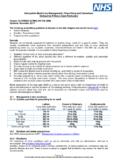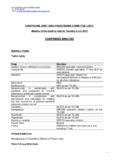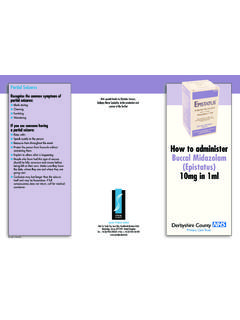Transcription of DERBYSHIRE JOINT AREA PRESCRIBING COMMITTEE (JAPC …
1 When to initiate PPIs with an NSAID (or antiplatelet) Produced: January 2014 Reviewed: December 2017 Review date: December 2019 Page 1 of 2 Proton Pump Inhibitors Advisory guidance on when to initiate a PPI with a NSAID (or antiplatelet) for gastro-protection Where a NSAID is indicated and to reduce the risk of gastrointestinal adverse effects the lowest effective dose for the shortest duration of treatment should be used. This document is intended as advisory it does not replace clinical judgement which is assessed on a case by case basis. As PPIs have become widely used, evidence has started to emerge regarding their long-term safety and potential for adverse effects. Clinicians when considering PRESCRIBING long term PPIs should consider if the risks (see below) outweigh the benefits. *To aid bioavailability of lansoprazole it should be taken at least 30 minutes before food. If this is difficult pantoprazole 20mg taken 1 hour before food is an alternative.
2 No Yes No Yes Yes Yes Need for NSAID or antiplatelet therapy Assess GI risk factors GI bleeding Dual antiplatelet therapy Concomitant oral anticoagulation/antiplatelet/ NSAID Patients >45 years of age receiving long-term regular NSAID Patients 65 years of age receiving short-term or intermittent NSAID1 History of ulcer complication History of ulcer disease (non-bleeding) Lansoprazole* 15mg OD Or appropriate cost effective PPI 1 Patient to be advised to only take PPI whilst receiving short-term or intermittent NSAIDs. Does the patient have two or more risk factors? 65 years of age (without NSAID) Oral Corticosteroid use Dyspepsia or GORD symptoms SSRIs Severe co-morbidity (malignancy, Heart failure (NYHA III-IV), significant liver or renal disease ( CKD 4&5 and cirrhosis) No PPI required Before commencing long-term treatment consider risks (see overleaf) vs benefits Test for H pylori; treat if infected DERBYSHIRE JOINT AREA PRESCRIBING COMMITTEE (JAPC) Key points Ensure that appropriate patients are monitored for side effects during treatment.)
3 PPI should be stopped when the NSAID/antiplatelet is stopped. For other indications of PPI usages ensure there is a set duration/ review date. Exercise caution in the elderly and in patients with other risk factors for Clostridium difficile infection or bone fractures. When to initiate PPIs with an NSAID (or antiplatelet) Produced: January 2014 Reviewed: December 2017 Review date: December 2019 Page 2 of 2 Known risks associated with long term PPI use Clostridium difficile infection (CDI) Observational studies have found the risk of acquiring CDI is approximately 2-3 times higher in PPI users than in non-users. PPI use during CDI treatment was associated with a 42% increased risk of recurrence. Public Health England guideline recommends that consideration be given to stopping or reviewing the need for PPIs in patients with or at high risk of CDI (antibiotic use, hospitalisation, advanced age & underlying morbidity and inflammatory bowel disease).
4 Osteoporotic fractures Observational studies suggest there may be a modest increase in the risk of hip, wrist or spine fracture associated with high dose and long term (>1 year) PPIs. Risk increases with a longer duration of PPI use in post - menopausal women with a history of smoking, which is known to inhibit calcium absorption. Smoking and PPI use may have a synergistic effect on fracture risk mediated by impaired calcium absorption. The Medicines and Healthcare products Regulatory Agency (MHRA) advice issued in April 2012 stated There is recent epidemiological evidence of an increased risk of fracture with long-term use of PPIs. Patients at risk of osteoporosis should be treated according to current clinical guidelines to ensure they have an adequate intake of vitamin D and calcium . Other adverse effects associated with PPI Adverse effects of PPIs are usually mild and reversible; however, through case reports and observational studies (subject to bias and causation difficult to prove) long term PPI treatment may be associated with uncommon, serious adverse effects such as: Hypomagnesaemia: MHRA, 2012 have warned of the risk of hypomagnesaemia following long-term use of PPIs, which occurs most commonly after one year of PPI treatment, and presents with fatigue, tetany, delirium, convulsions, dizziness, and ventricular arrhythmia.
5 Pneumonia: There is conflicting evidence on an association between PPI use and an increased risk of pneumonia. Although there appears to be an increase in risk of developing community acquired pneumonia in patients who have recently started PPI therapy, there is a lack of evidence to show that this applies to patients on long-term treatment. Rebound hypersecretion: PPI withdrawal may induce rebound acid hypersecretion, which could present as a worsening of symptoms that could be mistaken for disease relapse. However, due to weaknesses in the studies it cannot be concluded if symptoms are clinically important in patients or lead to reuptake of acid-suppressive medication. Tubulo-interstitial nephritis (TIN): A rare association has been reported between acute tubule-interstitial nephritis (TIN) and PPIs. It can occur between several hours and four months following treatment with a PPI. The standard treatment involves early diagnosis, withdrawing the causative drug, administering steroids and clinical assessment.
6 Very low risk of subacute cutaneous lupus erythematosus (Drug Safety Update September 2015): PPIs are associated with very infrequent cases of subacute cutaneous lupus erythematosus (SCLE), a non-scarring dermatosis that can develop in sun-exposed areas. References 1. NICE clinical knowledge summaries: NSAID PRESCRIBING issues revised January 2013 2. MHRA Volume 5 Issue 9 April 2012 3. MHRA Drug Safety Update, Volume 3, Issue 9 April 2010 4. ACCF/ACG/AHA 2010 expert consensus document on the concomitant use of proton pump inhibitors and thienopyridines: A focused update of the ACCF/ACG/AHA 2008 expert consensus document on reducing the gastrointestinal risks of antiplatelet therapy and NSAID use. J Am Coll Cardiol 2010; Available at: 5. ALL WALES PROTON PUMP INHIBITOR AND DYSPEPSIA RESOURCE PACK- MATERIAL TO SUPPORT APPROPRIATE PRESCRIBING OF PROTON PUMP INHIBITORS ACROSS WALES.
7 April 2013 6. Revised PINCER Query Library 2015, Evidence-based summaries. PRIMIS and The University of Nottingham. 7. PrescQIPP Bulletin 92 Safety of long term proton pump inhibitors May 2015. 8. DTB Vol 55 No 10 October 2017 PRESCRIBING PPIs Document produced by DERBYSHIRE Medicines Management Shared Care and Guidelines Group in consultation with: Dr Andrew F Goddard, Consultant Gastroenterologist, Derby Teaching Hospitals NHS Foundation Trust Dr Andrew Austin, Consultant Hepatologist and Lead Clinician in Gastroenterology, DTHFT











